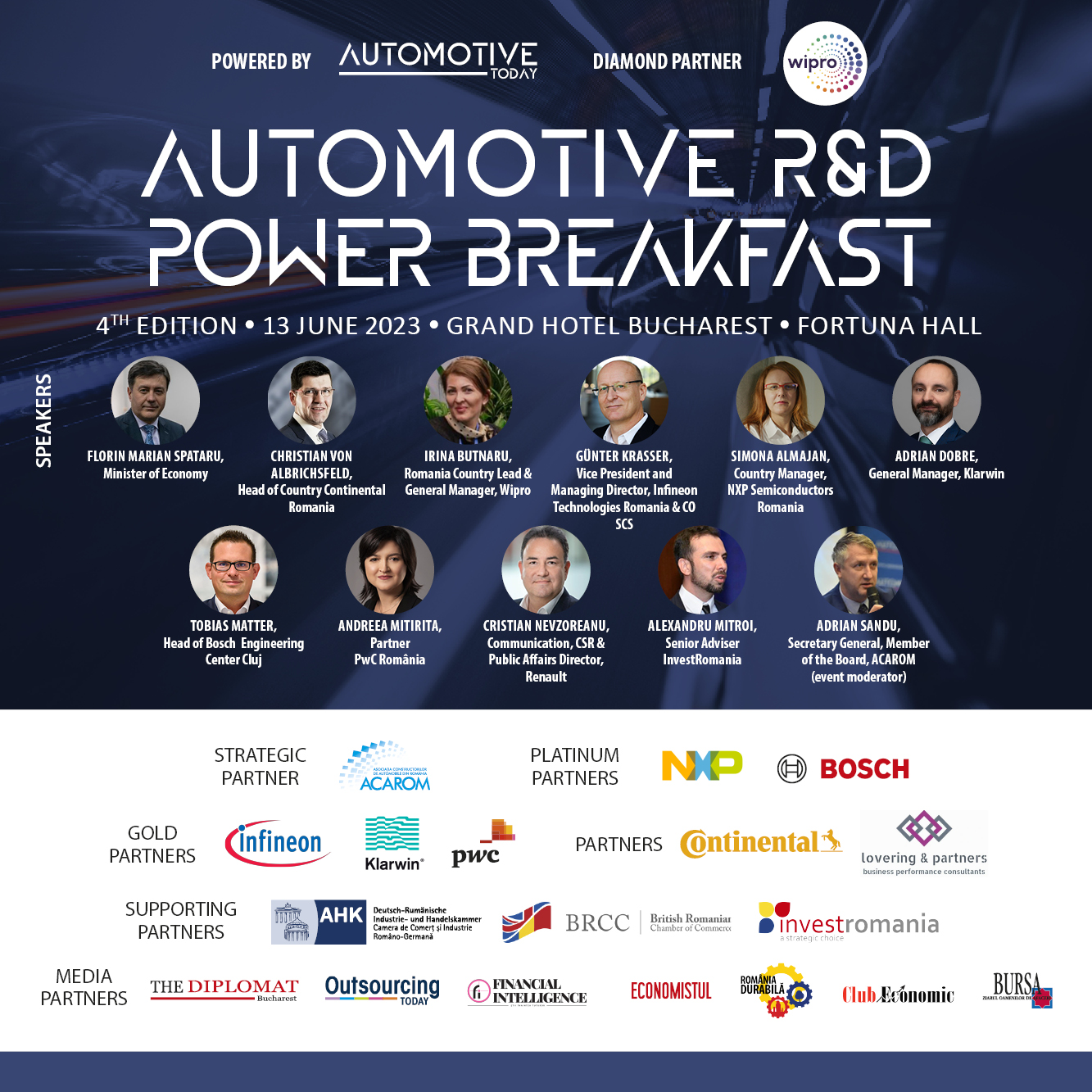Supply chain disruption and a shortage of skilled labor continue to hamper the ability of original equipment manufacturers (OEMs) to meet the demand for new vehicles, and 2022 has brought new challenges. The Russia–Ukraine conflict has exacerbated production and supply chain difficulties, mainly for European automotive companies. Inflation, high energy prices and the rising cost of raw materials such as nickel and steel are increasing production budgets and creating downward pressure on margins for suppliers.
To better put into light the updates, trends and expectations of the automotive industry, within a continuous age of transformation of this industry, The Diplomat Bucharest organizes THE AUTOMOTIVE POWER BREAKFAST on June 13th 2023, at GRAND HOTEL in Bucharest. The AUTOMOTIVE POWER BREAKFAST is a dedicated platform where specialists in the field share their expertise on the field, along with the key leaders and stakeholders in the industry.
Website event: AUTOMOTIVE R&D POWER BREAKFAST – POWERD BY THE DIPLOMAT- BUCHAREST & AUTOMOTIVE TODAY
DIAMOND PARTNER: Wipro
STRATEGIC PARTNER: ACAROM – The Association of Romanian Car Manufacturers
PLATINUM PARTNER: NXP Semiconductors, BOSCH Romania
GOLD PARTNERS: Infineon, Klarwin, PwC Romania
PARTNER: Continental
SUPPORTING INSTITUTIONS: Invest Romania, BRCC- British Romanian Chamber of Commerce, AHK Romania – Romanian-German Chamber of Commerce
MEDIA PARTNERS: Automotive Today, Outsourcing Today, Financial Intelligence, Economistul, Romania Durabila, Club Economic, Ziarul Bursa
CONNECTIVITY | AUTONOMOUS | ELECTRIFICATION | DECENTRALIZATION | TECHNOLOGY | CYBERSECURITY
AGENDA MAIN HOURS
09:00 – 10:00 Registration & Networking power breakfast
10:00 – 12:00 ROUNDTABLE SESSION
12:00 – 13:00 Networking lunch
PANELISTS
ADRIAN SANDU, Secretary General, Member of the Board, ACAROM ( event moderator)
FLORIN MARIAN SPATARU, Minister of Economy, Ministry of Economy
CHRISTIAN VON ALBRICHSFELD, Head of Country Continental Romania
GÜNTER KRASSER, Vice President and Managing Director, Infineon Technologies Romania & CO SCS
ALEXANDRU MITROI, Senior Adviser, Invest Romania
SIMONA ALMAJAN, Country Manager, NXP Semiconductors Romania
ADRIAN DOBRE, General Manager, Klarwin
CRISTIAN NEVZOREANU, Communication, CSR & Public Affairs Director, Renault Group
ANDREEA MITIRIȚĂ, Partner PwC Romania
IRINA BUTNARU, Romania Country Lead & General Manager, Wipro
TOBIAS MATTER, Head of Bosch Engineering Center Cluj
10:00 – 12:00 | AGENDA
THE PREMISES OF R&D FUNDING AND SUPPORT: AUTHORITIES AND GOVERNMENTAL INPUT
As in each highly technological industry, the automotive potential of growth is deeply based on research and development. The talents and their potential to deliver effective and ready to use innovative solutions are fundamental. And the leading voice of authorities, besides the regulations on the market build the ground and the available resources for the R&D arm of the automotive industry. Studies say that companies that invest 25 percent of their R&D budget in software applications are rewarded with strong growth.
STATE AID SUPPORT FOR THE AUTOMOTIVE SECTOR
The automotive industry has been the big winner of state aid in the last seven years, under scheme 807/2014 which supports investments with a major impact on the economy. Part of a concrete program, the state aid contributed to the growth of the local automotive industry, but also to the attraction of new suppliers of car components and to the expansion of the work base in the country. The trade deficit was thus reduced, and the local automotive sector can be a model to be replicated for other sectors of the economy.
SOFTWARE DEFINED VEHICLES
The shift from hardware to software orientation leaves the question of how automakers will optimize technology and create value. The evolution of the OEM business model by delivering a consumer-centric vehicle can be an extension of the user’s smartphone.
EURO 7: PRODUCTIVE OR COUNTERPRODUCTIVE PROPOSAL?
The European Automobile Manufacturers’ Association (ACEA) says that the European Commission’s proposal for new pollutant emission standards for cars and vans (Euro 7) and trucks and buses (Euro VII) risks slowing down the transition to zero-emission transport. Extraordinarily stringent testing and boundary conditions do little to improve air quality in daily driving. Yet they heavily increase the cost of vehicles, diverting precious resources – both engineering and financial – away from the zero-emission goal, according to ACEA. Recent studies have shown that the renewal of the fleet with the latest Euro 6/VI vehicles – alongside the electrification of new vehicles – would deliver an 80% reduction in road transport NOx emissions by 2035 (compared to 2020). Over the same timeframe, the most stringent Euro 7 scenarios would reduce road transport NOx emissions by less than a further 5% for cars and vans compared to Euro 6d levels, and by about 2% for trucks.
CYBERSECURITY CHALLENGES FOR THE INDUSTRY
The automotive industry is in a state of upheaval: both the boom in alternative drive options and the increased connectivity of vehicles are opening up new business models for manufacturing companies and suppliers. Enabled by numerous new digital features and services from manufacturers and third-party providers, the car is evolving from a pure means of transport into a space for living and working. This transformation has a strong impact on the ecosystem in which vehicles operate. Ensuring and actively managing the security and functionality of this ecosystem safeguards the well being of all users and also enhance the financial performance of automotive companies. For example, a lane-keeping assistant blocked by a denial-of-service attack endangers not only the occupants but also non-digital vehicles, pedestrians or other road users.
More details about the event are available HERE.
